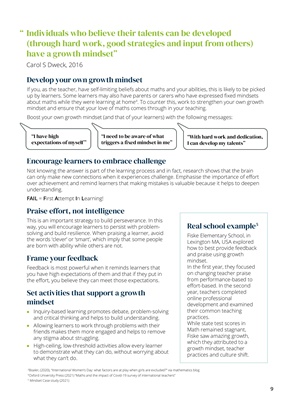
9
" Individuals who believe their talents can be developed
(through hard work, good strategies and input from others)
have a growth mindset"
Carol S Dweck, 2016
Develop your own growth mindset
If you, as the teacher, have self-limiting beliefs about maths and your abilities, this is likely to be picked
up by learners. Some learners may also have parents or carers who have expressed fixed mindsets
about maths while they were learning at home4. To counter this, work to strengthen your own growth
mindset and ensure that your love of maths comes through in your teaching.
Boost your own growth mindset (and that of your learners) with the following messages:
Encourage learners to embrace challenge
Not knowing the answer is part of the learning process and in fact, research shows that the brain
can only make new connections when it experiences challenge. Emphasise the importance of effort
over achievement and remind learners that making mistakes is valuable because it helps to deepen
understanding.
FAIL = First Attempt In Learning!
Praise effort, not intelligence
This is an important strategy to build perseverance. In this
way, you will encourage learners to persist with problemsolving and build resilience. When praising a learner, avoid
the words 'clever' or 'smart', which imply that some people
are born with ability while others are not.
Frame your feedback
Feedback is most powerful when it reminds learners that
you have high expectations of them and that if they put in
the effort, you believe they can meet those expectations.
Set activities that support a growth
mindset
l Inquiry-based learning promotes debate, problem-solving
and critical thinking and helps to build understanding.
l Allowing learners to work through problems with their
friends makes them more engaged and helps to remove
any stigma about struggling.
l High-ceiling, low-threshold activities allow every learner
to demonstrate what they can do, without worrying about
what they can't do.
Real school example5
Fiske Elementary School, in
Lexington MA, USA explored
how to best provide feedback
and praise using growth
mindset.
In the first year, they focused
on changing teacher praise
from performance-based to
effort-based. In the second
year, teachers completed
online professional
development and examined
their common teaching
practices.
While state test scores in
Math remained stagnant,
Fiske saw amazing growth,
which they attributed to a
growth mindset, teacher
practices and culture shift.
3Boaler, (2020), "International Women's Day: what factors are at play when girls are excluded?" via mathematics blog
4Oxford University Press (2021) "Maths and the impact of Covid-19 survey of international teachers"
5 Mindset Case study (2021)
"I have high
expectations of myself"
"I need to be aware of what
triggers a fixed mindset in me"
"With hard work and dedication,
I can develop my talents"